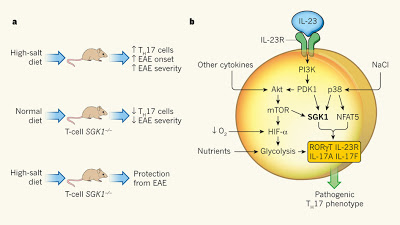The authors demonstrate that a high-salt diet increased the severity of experimental autoimmune encephalomyelitis (*EAE) – a mouse model of multiple sclerosis . The authors proposed that high salt-intake induces serum glucocorticoid kinase 1 (SGK1), which than promotes IL-23R expression and enhances TH17 ** cell differentiation in vitro and in vivo. SGK1 has has been shown to govern Na transport and salt (NaCl) homeostasis in other cells.
Mice lacking this kinase in their T cells have impaired expression of IL-17-family cytokines and of a receptor for another cytokine molecule, IL-23, which stabilizes the TH17 cell phenotype.
* EAE: Experimental autoimmune encephalomyelitis. An animal model of the human autoimmune disease multiple sclerosis. EAE is experimentally induced in animals by immunization with myelin or with peptides derived from myelin. The animals develop a paralytic disease with inflammation and demyelination in the brain and spinal cord.
** TH17 cells (T helper 17 cells). A subset of CD4+ T helper cells that produce interleukin-17 (IL-17) and that are thought to be important in inflammatory and
autoimmune diseases. Their generation involves IL-6, IL-21 and IL-23, as well as the transcription factors RORgt (retinoic-acid-receptor-related
orphan receptor-gt) and STAT3 (signal transducer and activator of transcription 3).


